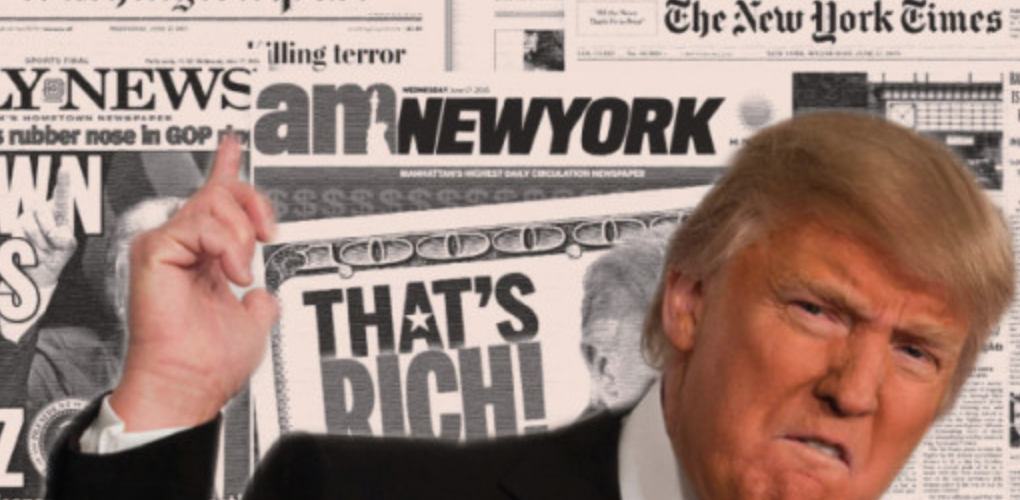The news media vs. Donald Trump.
Donald Trump vs. the mainstream news media.
Who will win in this epic life and death steel-cage wrestling match?
Well, you can argue that the media has already lost this battle, in that Trump now resides in the White House.
One could also argue that Trump has successfully rewritten the rules of public discourse in a way that has forced journalists to abandon many of their most important standards linked to fairness, objectivity and even accuracy. The more journalists veer into a Trump-style screaming match, the more they fit into the stereotypes that The Donald has created for them.
This brings us to an important Esquire piece written by magazine-pro Peter Boyer. If you know this work — including his years at The New Yorker — you know that he has a reputation as a reporter with an uncanny knack for covering both sides of tense, angry arguments. (See this classic New Yorker piece on Mel Gibson and The Passion of the Christ.)
So what does this Esquire piece have to do with religion-beat reporting? Read the following and think of former New York Times editor Bill Keller and his statement that the Times was attempting to do balanced, accuracy coverage of the news, “other than” many topics linked to culture, morality and religion.
So the scene opens with Boyer interviewing Trump:
… Amid those passing controversies was one story that Trump himself remembers clearly still. “Yep, very famous story,” he remarked to me in a recent interview. “It was a very important story…” Trump was referring to a front-page New York Times article published on August 8, 2016, under the headline “The Challenge Trump Poses to Objectivity.” The opening paragraph posed a provocative question:
“If you’re a working journalist and you believe that Donald J. Trump is a demagogue playing to the nation’s worst racist and nationalistic tendencies, that he cozies up to anti-American dictators and that he would be dangerous with control of the United States nuclear codes, how the heck are you supposed to cover him?”
There is more, of course:
Reporters who considered Trump “potentially dangerous,” [Jim] Rutenberg wrote, would inevitably move closer “to being oppositional” to him in their reporting — “by normal standards, untenable.” Normal standards, the column made clear, no longer applied.
Trump said that was an important article because “they basically admitted that they were frauds.”
“They admitted in that story that they didn’t care about journalism anymore,” he continued, “that they were just going to write badly. That was an amazing admission.”
It’s an essential Trumpian assertion — wildly hyperbolic, but containing what much of Red America would consider a sort of rough truth.
As someone who has opposed Trump at every stage of his political life — #NeverTrump #NeverHillary, to be precise — what I see happening is that The Donald tempted the press to fight fire with fire, to play in his arena on his terms.
What I would note is that Trump did to political reporting what the post-Roe v. Wade era (and especially the gay-marriage movement) had done to coverage of religion and culture. He Kellerized it.
Thus, elite newsrooms were no longer interested in doing accurate, fair, objective coverage of about half of the United States of America. That’s what I argued in two update posts — click here and then here — on the 10th anniversary of the birth of this website.
Here’s Boyer again, speaking as a former Times reporter:
For decades, Times journalists were deeply imbued with a sense of the Times’s way of doing things, instilled in them osmotically, as well as by consultation with the holy writ of proper form, The New York Times Manual of Style and Usage. The Style Book, as the manual was known in the newsroom (where I worked for three years in the 1980s), insisted upon a tone of impartial neutrality, the foundation upon which the Times’s claim to authority rested. Such common terms as “pro-life” and “pro-choice” were firmly rejected as being too politically charged. Tone was paramount. “Writers and editors should guard against word choices that undermine neutrality,” the 2015 version of the Style Book directed. “If one politician is firm or resolute, an opponent should not be rigid or dogmatic. If one country in a conflict has a leadership while the other has a regime, impartiality suffers.”
Thus, words matter.
Faithful GetReligion readers will remember the following quotes, which I have run here many times, that are draw from the 2005 Times self-study that followed a massive breakdown in newsroom ethics. Note that covering religion, and religious believers, was at the heart of this debate.
Tone?
The public editor found that the overall tone of our coverage of gay marriage, as one example, “approaches cheerleading.” By consistently framing the issue as a civil rights matter — gays fighting for the right to be treated like everyone else — we failed to convey how disturbing the issue is in many corners of American social, cultural and religious life. …
Too often we label whole groups from a perspective that uncritically accepts a stereotype or unfairly marginalizes them. As one reporter put it, words like moderate or centrist “inevitably incorporate a judgment about which views are sensible and which are extreme.” We often apply “religious fundamentalists,” another loaded term, to political activists who would describe themselves as Christian conservatives.
We particularly slip into these traps in feature stories when reporters and editors think they are merely presenting an interesting slice of life, with little awareness of the power of labels.
The Boyer article is a must-read. I wish someone would allow him to write a sequel, focusing on the implications of all this for the religion beat.










